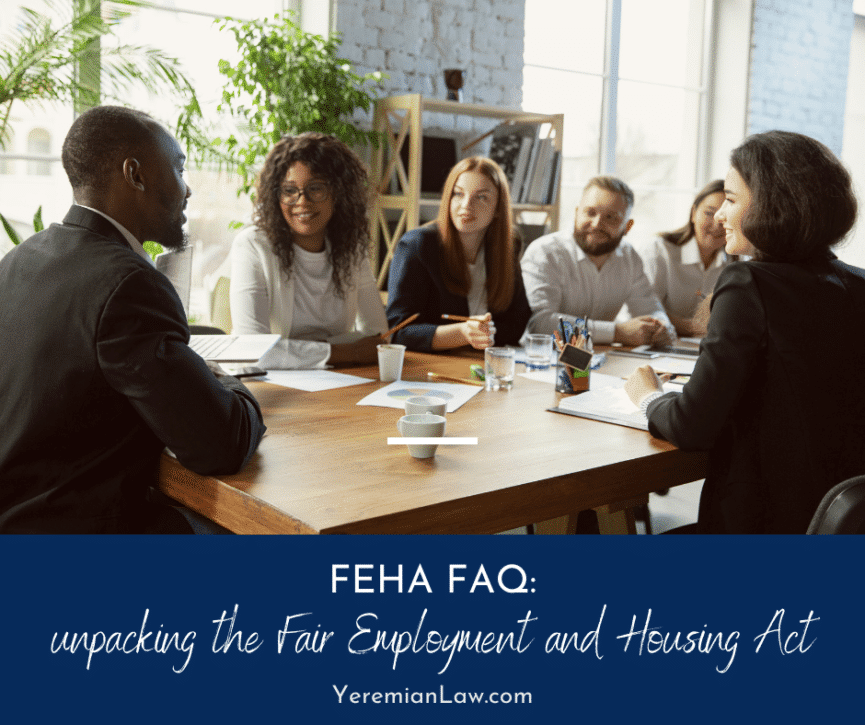If you’re like many people, you’ve heard of the Fair Employment and Housing Act, or FEHA – but do you know what it covers, which people it protects or much else about it? This guide to frequently asked questions about FEHA covers those things and more. If you have additional questions, or if you believe your rights under FEHA have been violated, please feel free to call us at 818-230-8380 for a free case review.

FEHA FAQ: Unpacking the Fair Employment and Housing Act
Some of the most common questions people have about FEHA include:
- What does FEHA cover?
- Is pregnancy a disability under FEHA?
- Does FEHA protect independent contractors?
- What are the protected classes under FEHA?
- What employment practices are illegal under FEHA?
- What is nondiscrimination in state-supported programs and activities?
- What is discrimination in housing?
Here’s a closer look at each.
Related: Employment law in California

What Does FEHA Cover?
California’s Fair Employment and Housing Act protects employees from unlawful discrimination and harassment related to employment. It also protects people from discrimination in state-supported programs and activities, as well as discrimination in housing.
FEHA outlines specific protected classes so there’s no question about who’s entitled to protection under the law.
Related: What rights do employees have in California?
Is Pregnancy a Disability Under FEHA?
Pregnancy falls under the definition of “sex,” which includes pregnancy, childbirth, breastfeeding and medical conditions related to any of those things. Although pregnancy is not considered a disability in the same sense that some other physical issues are – at least for the purposes of this law, it is still protected under FEHA.
Pregnancy disability under FEHA is any physical or mental condition related to pregnancy or childbirth that prevents a person from performing essential duties of a job, or if performing the job would cause undue risk to the mother or child. Some pregnancy disabilities include:
- Severe morning sickness
- Prenatal care
- Postnatal care
- Need for bed rest
- Gestational diabetes
- Pregnancy-induced hypertension
- Preeclampsia
- Post-partum depression
- Lactation conditions (such as mastitis)
- Loss or end of pregnancy
- Recovery from loss or end of pregnancy
Pregnancy is also protected under the federal Pregnancy Discrimination Act, which says that employers with 15 or more employees must treat pregnant women the same way they’d treat any other job applicants or employees with similar abilities or limitations.
Related: Guide to pregnancy discrimination in California

Does FEHA Protect Independent Contractors From Harassment?
FEHA typically protects independent contractors as well as employees. The anti-harassment section of the law specifically says it applies to “persons performing services pursuant to contract.” It also, in that same section, redefines employer to be “any person regularly employing one or more persons or regularly receiving the services of one or more persons providing services pursuant to a contract.”
What Are the Protected Classes Under FEHA?
These are the protected classes under FEHA:
- Age
- Ancestry
- Color
- Gender
- Gender expression
- Gender identity
- Genetic information
- Marital status
- Medical condition
- Mental disability
- Military status
- National origin
- Physical disability
- Race
- Religious creed
- Sex
- Sexual orientation
- Veteran status
Related: What every employee over 40 needs to know

What Employment Practices Are Illegal Under FEHA?
FEHA forbids employers from engaging in workplace discrimination in employment decisions, harassment and retaliation.
Discrimination in employment actions can involve:
- Hiring
- Firing
- Reassigning work duties
- Failure to promote
- Demotion
- Reducing (or threatening to reduce) wages or salary
- Relocation
- Refusal to send to training
- Denial of benefits
- A substantial adverse change in the terms and conditions of employment
This isn’t a complete list – there are many other ways a person can experience discrimination in employment actions, as well.
Related: Examples of discrimination in the workplace
What is Nondiscrimination in State-Supported Programs and Activities?
Nondiscrimination in state-supported programs and activities is part of FEHA. Every state contract and subcontract for public works, goods or services must contain a nondiscrimination clause that prohibits discrimination against people in the following protected classes:
- Sex and gender (including pregnancy, childbirth, breastfeeding or related medical conditions
- Race and color
- Gender identity and gender expression
- Religion and creed
- Ancestry and national origin
- Ethnic group identification
- Age
- Disability (mental or physical)
- Medical condition
- Genetic information
- Marital status
- Sexual orientation
Related: 5 signs of sexual orientation discrimination in the workplace
Do You Need to Talk to a Lawyer About FEHA?
If you believe your rights were violated under FEHA – or if you’ve seen workplace discrimination in your place of employment – we may be able to help you. Call us at 818-230-8380 now or fill out the form below for a free case review. We’ll discuss your situation, answer your questions and help you begin moving forward.




